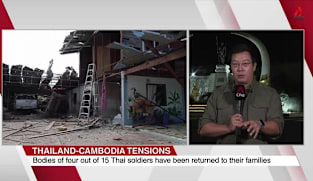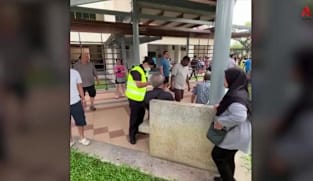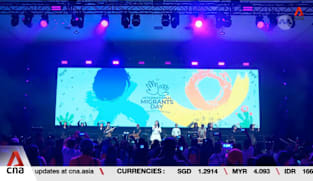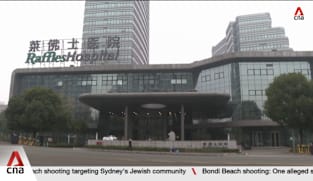Committee of Supply 2023 debate, Day 4: Chan Chun Sing on customised and porous pathways for diverse learners
Primary six pupils entering secondary school next year will be admitted through three Posting Groups, as Full Subject-based Banding (Full SBB) is implemented in secondary schools. The score ranges of the Posting Groups are mapped from the existing streams. Education Minister Chan Chun Sing, who outlined the changes in Parliament on Wednesday (Mar 1), said the vast majority of students will continue to be admitted to secondary schools based on their Primary School Leaving Examination (PSLE) scores. Starting from the 2024 Secondary 1 cohort, the Ministry of Education (MOE) will post Primary 6 students to secondary schools through three Posting Groups, mapped to the PSLE score ranges. Posting Group 1 is for Normal (Technical), Posting Group 2 for Normal (Academic) and Posting Group 3 for Express courses. Mr Chan said this ensures that schools continue to admit students with diverse strengths, while students continue to have access to a wide range of schools. Schools can also enable diversity at the class level, with mixed form classes that comprise students offering subjects at different subject levels, he said. Mr Chan said unlike streaming, Posting Groups will only be used to facilitate admissions, and to determine students' initial subject levels for most subjects at the beginning of Secondary 1. Beyond that, Posting Groups will not shape the secondary school experience, he said. Currently, students may choose to take certain subjects at a more demanding level if they are eligible. Under Full SBB, this flexibility has been expanded to more subjects. With guidance from their schools, some students have also begun to offer elective subjects at a less demanding level. This gives them room to pursue their interests without adding unduly to their overall curriculum load. At the end of secondary school, students will receive a common certificate, the Singapore-Cambridge Secondary Education Certificate (SEC), which reflects their different subject combinations and levels. Starting from 2027, the SEC will replace the separate Singapore-Cambridge General Certificate of Examination (GCE) O- and N-Level examinations. The option of spending a fifth year in secondary school will remain available to students who wish to offer subjects at a more demanding level. Mr Chan said to cater to a wider profile of students offering subjects at different subject levels, Full SBB changes will be accompanied by expanded admission and progression pathways in the Institutes of Higher Learning. Students should still have strong fundamentals to thrive in the pathways they choose. MOE will retain the existing junior college admission criteria to ensure that students can cope with the A-Level curriculum. Mr Chan also walked the House through the challenges and aspirations for each stage of Singapore’s education journey, from “giving every child a good start in life” to lifelong learning. With lifelong learning, the Government will do more for both the young and young-at-heart, as “what we teach and learn in the first 15 years is no longer adequate for the next 50 years without a significant top-up”. In close consultation with the Ministry of Trade and Industry, Ministry of Manpower and economic agencies, the Government will increase the “lifetime cohort participation rate” for publicly funded university degrees by 10 percentage points, from 50 per cent currently to 60 per cent by 2025, so that more Singaporeans can obtain a degree from the autonomous universities. MOE is also studying how to better support mid-career workers by enabling them to upskill ahead of job transitions. For example, it is considering how to provide more support through a SkillsFuture Credit top-up, and training allowances for mid-careerists in transition who go for intensive full-time training. Stressing the need for customised and porous pathways for continual learning across the life course, Mr Chan also highlighted three key enablers - technology, educators and partnerships - in the education journey.
Primary six pupils entering secondary school next year will be admitted through three Posting Groups, as Full Subject-based Banding (Full SBB) is implemented in secondary schools. The score ranges of the Posting Groups are mapped from the existing streams. Education Minister Chan Chun Sing, who outlined the changes in Parliament on Wednesday (Mar 1), said the vast majority of students will continue to be admitted to secondary schools based on their Primary School Leaving Examination (PSLE) scores. Starting from the 2024 Secondary 1 cohort, the Ministry of Education (MOE) will post Primary 6 students to secondary schools through three Posting Groups, mapped to the PSLE score ranges. Posting Group 1 is for Normal (Technical), Posting Group 2 for Normal (Academic) and Posting Group 3 for Express courses. Mr Chan said this ensures that schools continue to admit students with diverse strengths, while students continue to have access to a wide range of schools. Schools can also enable diversity at the class level, with mixed form classes that comprise students offering subjects at different subject levels, he said. Mr Chan said unlike streaming, Posting Groups will only be used to facilitate admissions, and to determine students' initial subject levels for most subjects at the beginning of Secondary 1. Beyond that, Posting Groups will not shape the secondary school experience, he said. Currently, students may choose to take certain subjects at a more demanding level if they are eligible. Under Full SBB, this flexibility has been expanded to more subjects. With guidance from their schools, some students have also begun to offer elective subjects at a less demanding level. This gives them room to pursue their interests without adding unduly to their overall curriculum load. At the end of secondary school, students will receive a common certificate, the Singapore-Cambridge Secondary Education Certificate (SEC), which reflects their different subject combinations and levels. Starting from 2027, the SEC will replace the separate Singapore-Cambridge General Certificate of Examination (GCE) O- and N-Level examinations. The option of spending a fifth year in secondary school will remain available to students who wish to offer subjects at a more demanding level. Mr Chan said to cater to a wider profile of students offering subjects at different subject levels, Full SBB changes will be accompanied by expanded admission and progression pathways in the Institutes of Higher Learning. Students should still have strong fundamentals to thrive in the pathways they choose. MOE will retain the existing junior college admission criteria to ensure that students can cope with the A-Level curriculum. Mr Chan also walked the House through the challenges and aspirations for each stage of Singapore’s education journey, from “giving every child a good start in life” to lifelong learning. With lifelong learning, the Government will do more for both the young and young-at-heart, as “what we teach and learn in the first 15 years is no longer adequate for the next 50 years without a significant top-up”. In close consultation with the Ministry of Trade and Industry, Ministry of Manpower and economic agencies, the Government will increase the “lifetime cohort participation rate” for publicly funded university degrees by 10 percentage points, from 50 per cent currently to 60 per cent by 2025, so that more Singaporeans can obtain a degree from the autonomous universities. MOE is also studying how to better support mid-career workers by enabling them to upskill ahead of job transitions. For example, it is considering how to provide more support through a SkillsFuture Credit top-up, and training allowances for mid-careerists in transition who go for intensive full-time training. Stressing the need for customised and porous pathways for continual learning across the life course, Mr Chan also highlighted three key enablers - technology, educators and partnerships - in the education journey.



















